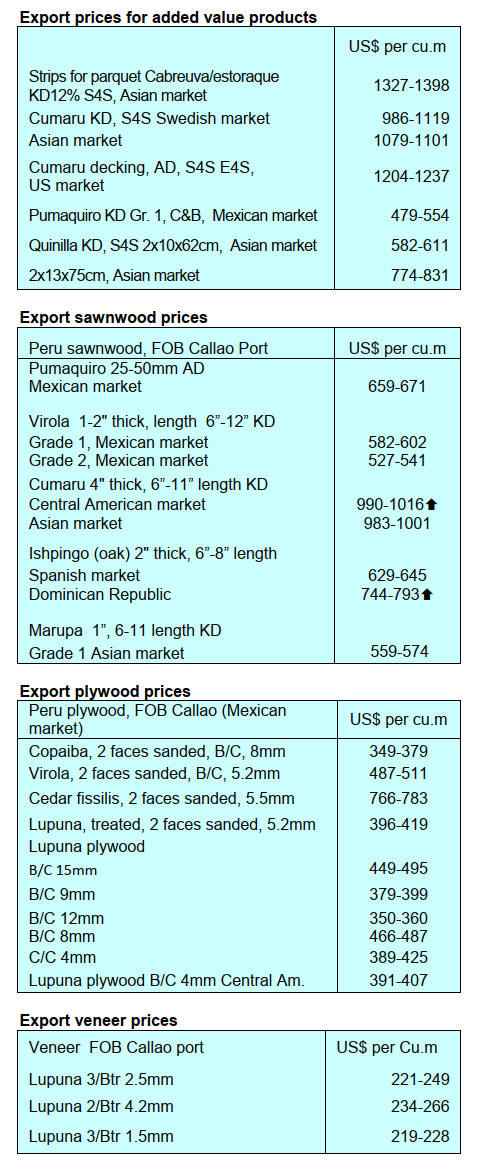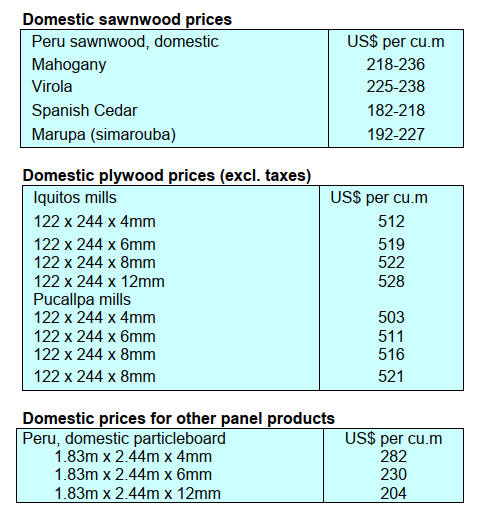March exports a record
Ghana’s wood product export data for the first four
months of 2023 reveal that March exports were the highest
at 31,467 cu.m representing 31% of the total export
volume of 101,997cu.m for the four month period. Last
year March exports were 30,615 cu.m and represented
30% of the total for the four month period.
Wood product exports in the first four months of 2023
earned the country Eur14.54 million compared to the
Eur10.78 million in 2022. The data show there was a 35%
increase in earnings and a 3% increase in shipment
volumes.
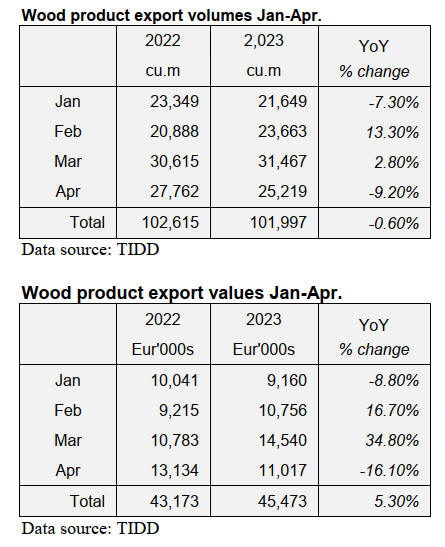
According to the Timber Industry Development Division
(TIDD) report, in the first four months of this year the
leading wood products exported were air and kiln dry
sawnwood, billets and plywood.
Exports earnings from SPWP rise
Of total exports, secondary processed wood poducts
(SPWP) including furniture parts, moulding and flooring
earned Eur40.17 million in the first four months of 2023,
up 8% from the same period in 2022 while tertiary wood
products (TWP) exports earned just Eur2.44 million, up
6% year on year. However, receipts from primary wood
products dropped 24% to register Eur2.86 million in 2023.
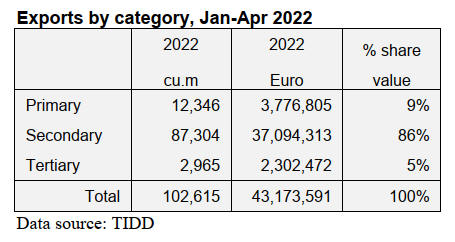
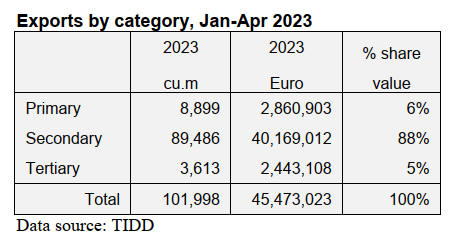
Air and kiln dry sawnwood accounted for more than half
of the total export volume in the first four months of 2023.
Compared to 2022, the value of exports of these two
products rose 19% and 4% respectively.
The TIDD report also indicated the average unit price for
KD sawnwood was Eur662/cu.m, AD sawnwood
Eur366/cu.m, plywood (regional market) Eur394/cu.m and
billets Eur311/cu.m.
Business Expo leads to MoU with US National Black
Chamber of Commerce
Trade between Ghana and the US reached an all-time high
of US$3.7 billion in 2022 with a favourable balance of
trade to Ghana. The country’s export to the US in 2022
amounted to US$2.7 billion while imports from the US
were US$1.0 billion. The Minister of Trade and Industry,
KT Hammond, made this known to the media at the 2023
US – Ghana Business Expo on the theme “Leveraging
U.S. – Ghana Trade Relation for Growth and Prosperity”.
The American Chamber of Commerce website says the
Expo will provide an overview of the current trade
relations between the United States and Ghana,
highlighting success stories, identifying potential areas of
growth, and outlining strategies for fostering further
collaboration with integrated business-to-business
meetings between Ghanaian and U.S. companies.
As part of the Expo, the U.S. Department of Commerce
will lead a Global Diversity Export Initiative (GDEI) trade
delegation that includes 19 companies and six trade
associations, including the National Black Chamber of
Commerce, the National Business League, US Black
Chambers Inc., Dallas Black Chamber of Commerce, the
National Center for American Indian Enterprise
Development and the Organization for Women in
International Trade.
The Expo aimed at providing a platform that would foster
bilateral trade collaborations and economic growth
between Ghana and the US. Business Associations from
the US, the Black Global and Business Network (BGBN)
and the National Black Chamber of Commerce (NBCC)
signed Cooperation agreements for business connections
and exchanges at the Business Expo.
The President of the Association of Ghana Industries
(AGI) Dr. Kwesi Humphrey Ayim Darke and the
Chairman of the Accra Regional Branch of AGI, Mr
Tsonam Cleanse Akpeloo, met the leaders to discuss the
cooperation terms and objectives.
The National Black Chamber of Commerce, said to be the
largest Black business association in the world, is
dedicated to economically empowering and sustaining
African American communities through entrepreneurship
and capitalistic activity within the US and the Black and
Global Business Network is the largest Network ever
convened to solely focus on expanding, connecting and
empowering Black International Entrepreneurs.
See:
https://amchamghana.org/event/2023-u-s-ghana-business-expo/
and
https://agighana.org/agi-signs-corporate-agreements-with-the-usa-black-national-chambers-of-commerce-and-black-global-business-network/
AGI raises concerns on duplication by Organised
Crime Office
The Association of Ghana Industries (AGI) has become
concerned at the frequent visits to some of its members by
representatives of the Economic and Organised Crime
Office (EOCO).
According to the chairman for the Ashanti, Bono and
Bono East Regions AGI, Kwasi Nyamekye, EOCO
officials frequent the offices of its members and regularly
request for the financial statements and sales records
among others which the Ghana Revenue Authority (GRA)
also regularly reviews. Nyamekye said EOCO requests for
the same information as collected by the GRA is a
duplication and companies are becoming concerned.
See:
https://thebftonline.com/2023/08/18/agi-unhappy-over-eocos-non-stop-presence-at-members-premises/
IFAD approves US$52.5 million loan
The Ghana Government has received approval to arrange a
US$52.5 million loan from the International Fund for
Agricultural Development (IFAD) to finance the
Promotion of a Rural Opportunities, Sustainable Profits
and Environmental Resilience (PROSPER) project.
The PROSPER project is designed to complement ongoing
interventions in the agricultural sector such as Planting for
Food and Jobs (PFJ) with a concentration on smallholder
farmers, the Ghana Agricultural Sector Investment
Programme (GASIP), the Savannah Zone Agricultural
Productivity Improvement Project (SAPIP) and the
Savannah Investment Programme (SIP) among others.
See:
https://webapps.ifad.org/members/eb/134/docs/EB-2021-134-R-45-Rev-1.pdf
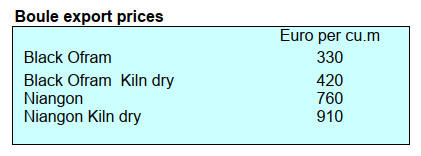
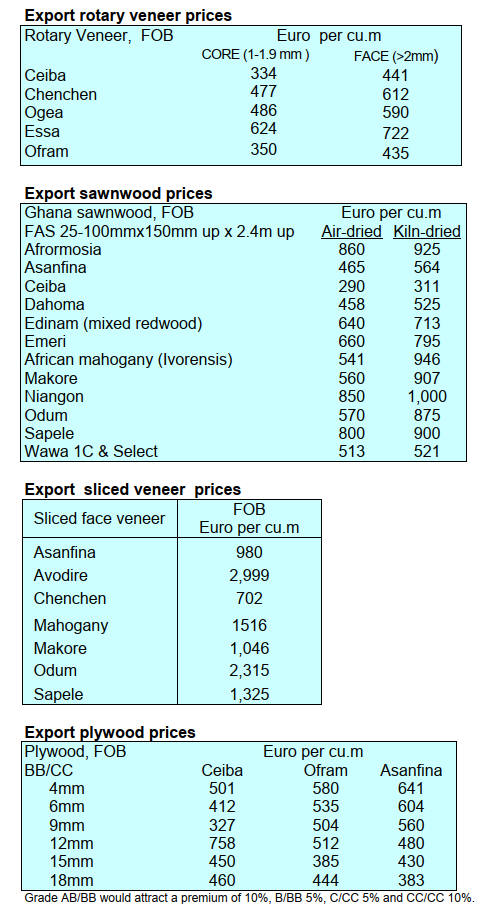
3. MALAYSIA
Strengthened law
enforcement contributed to decline
in deforestation
The Guardian newspaper in the UK reported Global Forest
Watch (GFW) Senior Geographic Information System
Research Manager, Liz Goldman, as saying Malaysia and
Indonesia can be considered examples of success stories in
controlling deforestation and the counties have made
strides where deforestation was concerned for a number of
years
The Guardian also quoted Arief Wijaya, Programme
Director for the World Resources Institute in Indonesia as
saying strengthened law enforcement, peatland restoration,
fire mitigation efforts and farming bans in sensitive areas
contributed to the fall in deforestation.
See:
https://www.theguardian.com/environment/2023/aug/07/progress-on-slowing-deforestation-could-boost-climate-efforts-say-experts-aoe
Promoting trade in domestic currencies
Indonesia, Malaysia and Thailand intend to promote the
use of local currencies in bilateral transactions. According
to a joint statement by Bank Indonesia, Bank Negara
Malaysia and the Bank of Thailand MoUs have been
signed providing a framework for cooperation to promote
bilateral transactions in local currencies. This agreement
was concluded on the sidelines of the recent ASEAN
Finance Ministers and Central Bank Governors’ meeting.
See:
https://www.aa.com.tr/en/asia-pacific/indonesia-malaysia-thailand-sign-deal-to-use-local-currencies-in-bilateral-transactions/2976340
Logging to continue as carbon markets developed
At a seminar on Introduction of Forest Carbon Activities
in Sarawak, Forest Department Director, Hamden
Mohammad, said logging activities in Sarawak will
continue along side the new emphasis on forest carbon
activities. He said that completely stopping logging and
timber processing would adversely impact the livelihood
of many people, particularly those involved in downstream
activities. Hamden made this clarification after opening a
seminar on Introduction of Forest Carbon Activities in
Sarawak.
Hamden said since 2018 the pace of logging has slowed
from the 8 million cubic meteres to 3-4 million cubic
metres in 2020 to around 2 million cubic metres in 2022.
See:
http://theborneopost.pressreader.com/article/281479280936526
Environmental sustainability and social
responsibility
During the Malaysian Wood Expo (MWE) 2023 the
Malaysian Timber Council (MTC) arranged for a
presentation on the growing demands of consumers and
investors for corporations to improve their social
responsibility. MTC invited the Chairperson of the Ethical
Trade Alliance (ETA), Lawrence Christoffelsz, to speak
on this topic.
In the presentation “Forced Labour and Sustainability
Reporting Requirements in Global Trade” Christoffelsz
highlighted the rapid increase in global reporting
requirements, including the issue of modern day slavery,
carbon reporting, climate change, corporate social
responsibility (CSR) and environmental social governance
(ESG).
Christoffelsz said “Regulations across the globe are
leading to restriction and export and import bans of certain
products that don’t comply with ESG requirements,
amongst others.”
He also mentioned the list of countries that were banned in
2022 for forced labour and the European Union’s Carbon
Border Adjustment Mechanism (CBAM) which targets
imports of carbon-intensive products that are in full
compliance with international trade rules.
“The entire supply chain must be transparent and
accountable,” said Christoffelsz adding that there are
opportunities in this area to create new revenue streams as
companies become ethical and sustainable across the
globe.
See:
https://mtc.com.my/images/publication/253/TM_may_June_23.pdf
In related news, Sarawak Premier, Abang Johari Tun
Openg, has said the operations of Sarawak Timber
Industry Development Corporation (STIDC) need to
reflect the global shift towards the environmental
sustainability agenda.
He explained that global banking institutions are now
encouraging companies to comply with environmental,
social and governance (ESG) initiatives, and products
produced by sustainable practices are preferred. He urged
STIDC to adapt Sarawak becomes a recognised positive
player for the environment.
See:https://theborneopost.pressreader.com/article/281565180296521
Sabah law to control biological resource use
A Bill was passed in the Sabah State Legislative Assembly
to amend the Sabah Biodiversity Enactment 2000 and
provide for the control of biological resources to stop
anyone from keeping, selling, buying or exporting any
protected biological resource without a valid license from
the Sabah Biodiversity Centre.
The Sabah Biodiversity Center had identified biological
resources that need to be protected and have been listed in
the proposed amendment to ensure that the genetic rights
of the plants are protected in accordance with international
requirements (Nagoya Protocol).
For more details visit:
https://theborneopost.pressreader.com/article/281522230613995
In related news, Sabah is keen to expand its biomass
industry especially now that most countries are
transitioning or in the process of adapting green
technology or green energy. In realising the advantages of
biomass in the production of high value-added products,
such as bio-pellets, bio-fuels and bio-based chemicals, the
Sabah Industrial Development and Entrepreneurship
Ministry is drafting the Sabah Biomass Policy to further
develop the sector.
See:
https://theborneopost.pressreader.com/article/281522230613995
and
https://www.nst.com.my/news/nation/2023/08/940722/sabah-expand-biomass-industry-through-policy-regulations
Through the eyes of industry
The latest GTI report lists the challenges identified by the
private sector in Malaysia.
See:
https://www.itto-ggsc.org/static/upload/file/20230816/1692147989860563.pdf
4.
INDONESIA
July exports - paper,
pulp and plywood the top three
Exports of wood products in July 2023 rebounded after
falling in June to reach US$1.23 billion with a volume of
1.4 million tonnes. Between January and July 2023
exports of wood products totalled US$7.7 billion. In terms
of value exports were 46% of 2022 exports of US$14.21
billion. Exports of paper dominated exports in the first
seven months of 2023 at 33% of the total export value.
The second largest contributor to exports was pulp
products at 28% followed by plywood at 16% of total
exports for the period. The main export destination for
Indonesian wood products were Asian markets at 67% of
the total followed by North America 14% and the EU at
11%.
See:
https://forestinsights.id/kinerja-ekspor-produk-kayu-juli-2023-kontribusi-plywood-capai-159-persen/
Trade Minister Hasan to the UK - keep trade policies
open
Trade Minister Zulkifli Hasan urged the United Kingdom
not to adopt policies that could hinder Indonesia's exports
which he said appears the EUDR will.
In a bilateral meeting with British Minister of State for
International Trade, Nigel Huddleston, Hasan reported that
the UK's environmental policies were discussed against
the background of the EUDR. In addition to environmental
policies, Hasan revealed that he and Minister Huddleston
discussed the upgrade of their Joint Economic and Trade
Committee (JETCO) into a Comprehensive Economic
Partnership Agreement (CEPA).
Meanwhile, Deputy Minister of Trade, Jerry Sambuaga,
said that Indonesia had sent a clear message regarding the
importance of formulating and implementing balanced,
egalitarian and fair trade policies.
See:
https://en.antaranews.com/news/291561/trade-minister-hasan-expects-uk-to-not-implement-eudr-like-policies
and
https://finance.detik.com/berita-ekonomi-bisnis/d-6886147/zulhas-harap-kebijakan-lingkungan-inggris-tak-ganggu-ekspor-pertanian-ri
In a related development, Indonesia stressed the
importance of upholding the principles of equality and
fairness in trade with the EU during the ASEAN-EU
Economic Ministers' Consultative Meeting.
Sambuaga said Indonesia emphasised the importance of
ensuring balance and upholding objective principles to
incorporate the values of fairness and equality into trade.
The Deputy Minister affirmed that related parties should
take into account objective principles during the policy
formulation process in the hopes of creating a fair trade
climate for all.
See:
https://en.antaranews.com/news/291564/indonesia-spotlights-importance-of-trade-equality-fairness-to-the-eu
Customary forest disbursement target – 80%
achieved
The Ministry of Environment and Forestry (KLHK) is
optimistic that the distribution of customary forests will
achieve the 2023 target. Based on Presidential Decree No.
28 of 2023 the target is to distribute 380,000 hectares.
Currently 308,495 hectares of land have been given
customary forest status.
The Director General of Social Forestry and
Environmental Partnerships in the Ministry of
Environment and Forestry, Bambang Supriyanto, said that
political issues will not be allowed to interfere with the
process of granting customary forests to communities.
Bambang explained that the Ministry of Environment and
Forestry would step in to monitor and guide the local
governments if they experienced problems in preparing
customary forest proposals in order to accelerate the
process of granting customary forest status to the
community.
See:
https://www.cnnindonesia.com/nasional/20230809180158-20-984029/klhk-kejar-target-beri-hutan-adat-tahun-ini-sudah-80-persen
Carbon Exchange launch planned for September
The Chairman of Financial Services Authority (OJK),
Mahendra Siregar, has targeted late September for the
launch of Indonesia's carbon exchange. Currently, the
Ministry of Law and Human Rights is processing the
release of OJK regulation on carbon exchange.
Previously, the Chief Executive of Capital Markets,
Financial Derivatives and Carbon Exchange Supervisor of
OJK, Inarno Djajadi, said that the regulation, PIJK No. 14
of 2023 will provide the legal definition and steps
necessary for the conduct of a carbon exchange trade.
See:https://en.tempo.co/read/1762117/ojk-to-launch-carbon-exchange-in-september
Ministries collaborate to help MSMEs go global
Indonesia's Foreign Affairs and Finance ministries have
agreed to collaborate to help micro, small and medium
enterprises (MSMEs) enter global markets.
To strengthen cooperation the two ministries signed a
Memorandum of Understanding (MoU) on Cooperation in
the Field of State Finance and Foreign Relations to
Support Economic Diplomacy.
Finance Minister, Sri Mulyani Indrawati, said the
government will support MSMEs to enter global markets,
adding that she anticipates the collaboration between the
two ministries to be implemented immediately in
Indonesia's 131 representative offices overseas .
In the short term, Marsudi asked a team from the Foreign
Affairs and Finance ministries to map out strategies for
MSMEs and report on opportunities for Indonesian
MSME products.
See:
https://en.antaranews.com/news/291078/foreign-finance-ministries-ink-mou-to-help-msmes-go-global
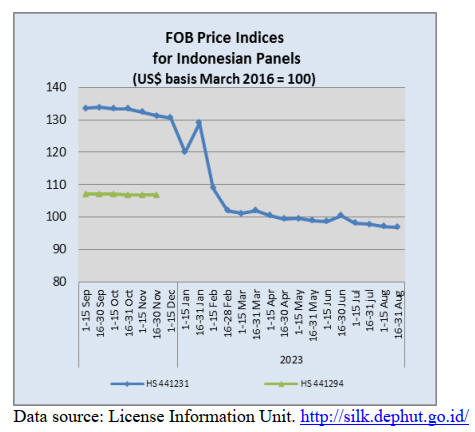
Through the eyes of industry
The latest GTI report lists the challenges identified by the
private sector in Indonesia.
See:
https://www.itto-ggsc.org/static/upload/file/20230816/1692147989860563.pdf
5.
MYANMAR
Currency stabilisation task force
The Central Bank of Myanmar (CBM) plans to form a task
force comprising officials from the Bureau of Special
Investigation (BSI), an intelligence agency, a security
service and a department under the Ministry of Home
Affairs to try to bring the exchange rate and the price of
gold under control.
Myanmar has been hit by soaring inflation and attempts to
cool it have not been successful. The latest blow came
early this month after the circulation of a new 20,000-kyat
banknote and the news of freezing about US$1 million by
a Bangladesh bank. Recently the exchange rate varied
from 3600 to 3900 Kyats/US dollar.
The administration has repeated warning to exporters that
they must bank all export earnings within 45 days and that
recently 78 companies were charged for failing to show
bank transaction records for export earnings with the
founders of two companies being imprisoned. He added
that plans are in the works to charge more than 80 other
companies.
The amount of unbanked export earnings is claimed as
much as US$2 billion since 2016. The CBM ordered
exporters to convert 60% of export earnings into kyats at a
fixed rate but this was recently adjusted to 50%. The CBM
has repeatedly claimed that foreign exchange rates and
gold prices were rising because certain businesses are
manipulating them.
Just after the CBM revealed its plan to organise a
task
force to scrutinise, investigate and take action against
market manipulation the foreign exchange rate dropped
from 3900 Kyats to 3600/3650 Kyats per US dollar. The
CBM is taking action against speculators in the foreign
exchange market and illegal money changers to contain
the rising gold prices and dollar exchange rate.
In related news, Sonali Bank, a state-owned Bangladeshi
bank that handles most of the bilateral trade with
Myanmar has frozen the accounts of two key Myanmar
banks on the advice of the US embassy in Dhaka which
asked the government to apply to sanctions imposed by the
US Treasury. The accounts of the Myanma Foreign Trade
Bank (MFTB) and Myanma Investment and Commercial
Bank (MICB) which reportedly have deposits of over
US$1 million at Sonali Bank have been frozen.
See:
https://www.irrawaddy.com/business/myanmar-junta-to-form-task-force-to-tackle-soaring-exchange-rates-gold-prices.html
and
https://www.mizzima.com/article/dollar-trading-difficult-myanmar-after-central-bank-revokes-money-changer-licenses)
and
https://www.asiafinancial.com/key-bangladeshi-bank-freezes-myanmar-regime-accounts
US sanctions aviation fuel suppliers
On 23 August, the US Office of Foreign Assets Control of
Treasury Department issued sanction notices against
a few individuals that operate in the jet fuel sector. Two
individuals and one entity that are involved in the
procurement and distribution of jet fuel to the Myanmar
army have been identified. The targeted persons and
companies are believed to be Singapore-based commercial
entities.
See:
https://home.treasury.gov/news/press-releases/jy1701
6.
INDIA
Wood product price indices tilt lower
The annual rate of inflation based on all India Wholesale
Price Index (WPI) in July was minus 1.36% compared to
minus 4.12% recorded in June 2023. The decline in the
rate of inflation in June, 2023 is primarily due to fall in
prices of mineral oils, basic metals, chemical and chemical
products, textiles and food products.
Out of the 22 NIC two-digit groups for manufactured
products, 11 groups saw an increase in prices whereas 10
groups witnessed a decrease. The increase in price was
mainly contributed by food products; machinery and
equipment; computers, electronic and optical products and
other non-metallic mineral products. Some of the groups
that have witnessed a decrease in prices in July were basic
metals; chemical and chemical products; textiles, paperand
paper products, wood panels and sawnwood.
See:
https://eaindustry.nic.in/pdf_files/cmonthly.pdf
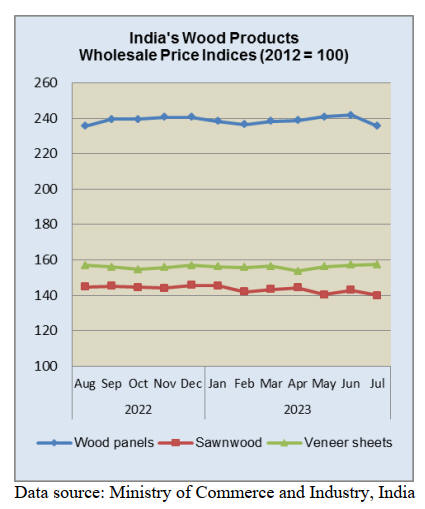
Plywood industry output back to pre-pandemic
levels
The nearly 500 plywood manufacturing units in South
India such as Kerala and Andhra Pradesh have returned to
near normality after a crisis triggered by de-monetisation,
the epic floods of 2018 and the two years of COVID
pandemic. Industry sources said the plywood industry,
however, had its own share of problems caused by the
general deceleration in the economy. But it hopes to go
full steam with the recovery of the economy.
One of the issues confronting the industry is shortage of
raw materials. However, sources said it was a seasonal
issue as raw materials fall short of demand when the rainy
season sets in.
In the long run, the industry had expressed the view that
the government should encourage planting of softwood to
enable the sector to have sufficient raw materials.
Besides, there is shortage caused by the slowdown in
replanting of rubber trees in the State. The industry is
important in terms of employment generation and its
general contribution to the State’s economy. Sources said
the plywood industry in Kerala directly employed around
50,000 people.
https://www.thehindu.com/news/cities/Kochi/plywood-industry-picks-up-pace-after-pandemic/article66980093.ece
Economic activity gaining momentum
India has seen economic activity gaining momentum amid
continuing global uncertainties. The last quarter’s GDP
data was surprising but not completely unexpected. The
GDP growth in the fourth quarter has pushed up the full-
year GDP growth of FY2022–23 to 7.2%, higher than
forecast. The recently released Annual Economic
Review for May 2023 highlighted that quarterly trends in
consumption and investment exceeded pre-pandemic
levels.
Most analysts are bullish about the Indian economy
expecting the India economy to grow between 6% and
6.3% in FY2023–24. The significance of these
developments and their implications for India are
discussed in a review by the IMF. The first-quarter data is
driving confidence in the improving health of the Indian
economy, inflation has been contained and is at the lowest
since the quarter of September 2019.
See:
https://asia.nikkei.com/Economy/IMF-upgrades-India-economic-outlook-while-China-s-recovery-loses-steam
and
https://www2.deloitte.com/us/en/insights/economy/asia-pacific/india-economic-outlook.html
Interset rate hike dampens demand for affordable
housing
India Today has reported affordable housing demand has
weakened sharply. Consultant firm Knight Frank India has
said sales of affordable housing fell due to the Reserve
Bank of India’s aggressive interest rate hike which
significantly increased the cost of housing loans. Demand
for affordable housing has declined compared demand in
the mid and high-range segments of the market.
In related news it is anticipated that Delhi will see a big
surge in housing-unit launches during the forthcoming
festive period as many a slew of developers acquired land
over the past six months to address the escalating demand
for homes . In the first half of this the number of new units
available was close to that in the first half of 2019.
See:
https://www.indiatoday.in/business/story/affordable-housing-in-india-takes-a-hit-knight-frank-research-report-2423050-2023-08-18
and
https://timesofindia.indiatimes.com/business/india-business/delhi-ncr-set-for-record-housing-unit-launches-in-festive-season-luxury-segment-in-focus/articleshow/102835302.cms?from=mdr
RBI seems to have acted to support rupee
The Indian rupee has recovered slightly from its recent
record low of around 83.5 to the US dollar helped by a
reversal in US Treasury yields which also offered support
to other Asian currencies. The rupee has been under
consistent pressure in recent sessions and observers
suggest it has required US dollar sales by the Reserve
Bank of Indi a (RBI) to steady the exchange rate.
See:
https://www.reuters.com/markets/currencies/rupee-recovers-record-closing-low-importers-exporters-more-active-2023-08-18/
Import prices, June 2023
Teak log prices
Teak prices are being updated for inclusion in the next
report
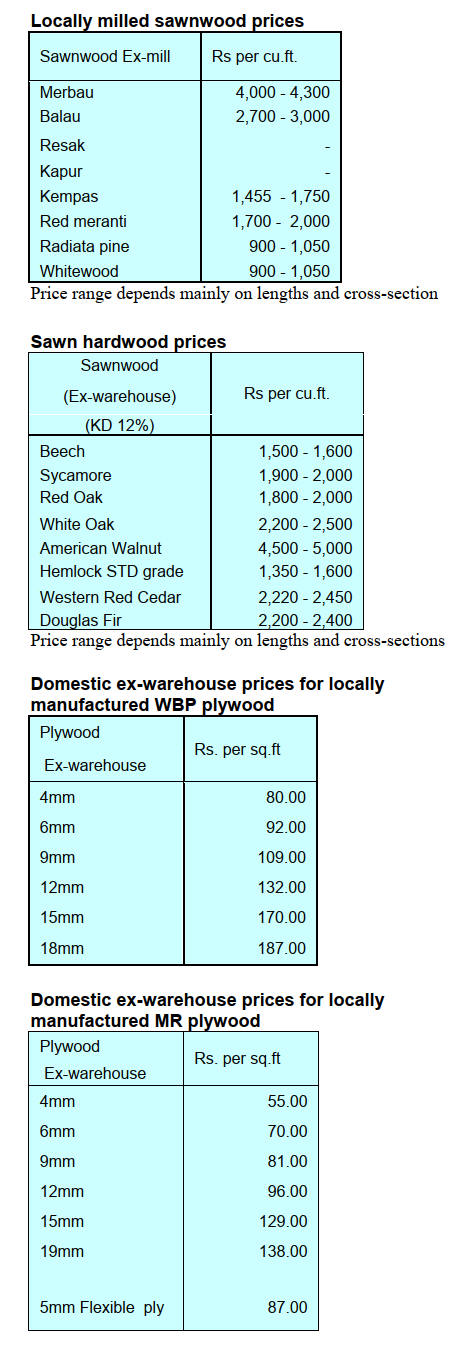
US hardwood exports to India
The value of US hardwood exports to India reached
US$3.247mil. in the first quarter of 2023 according to the
latest data released by the United States Department of
Agriculture (USDA). Total hardwood sawnwood
shipments from the US to India increased by 36% in value
to US$2.142mil., up from US$1.581mil. for the same time
period in 2022 and by 68% in volume to reach 3,796 cu.m.
The USDA data shows direct exports of American
hardwood veneers to India were worth US$77,000, up by
38% and exports of hardwood logs increased by 50% to
2,023 cu.m.
The top five American hardwood species exported to India
in the first quarter 2023 were ash, white oak, red oak,
maple and hickory.
See:
https://panelsfurnitureasia.com/exports-of-us-hardwoods-to-india-hit-us3-247m-in-q1-2023/
Sculpture from ancient teak log
A 700-year-old teak log has been sculptured into an image
of Ananta Seshasayana Sri Maha Vishnu reclining on a
coiled snake by artists from Myanmar and India
commissioned by Anuradha Timbers International.
See:
https://www.thehindu.com/news/cities/Hyderabad/700-year-old-teak-turned-into-a-sculpture-of-vishnu-in-hyderabad/article67022796.ece
7.
VIETNAM
Wood and wood product (W&WP) trade highlights
According to statistics from Vietnam General Department
of Custom W&WP exports to the US in July 2023 were
valued at US$609.3 million, down 11% compared to July
2022. In the first 7 months of 2023 W&WP exports to the
US were recorded at US$3.9 billion, down 30% over the
same period in 2022.
In July 2023 exports of kitchen furniture reached US$108
million, up 2.8% compared to June 2023, the third
consecutive monthly increase. However, when compared
to July 2022 the export value decreased by 14%.
In the first 7 months of 2023 the exports of kitchen
furniture totalled US$633.2 million, down 24% over the
same period in 2022.
Vietnam's office furniture exports in July 2023 were
valued at US$25 million, down 25% compared to July
2022. In the first 7 months of 2023 office furniture exports
totalled US$148 million, down 34% over the same period
in 2022.
Imports of logs and sawnwood from Southeast Asia in
July 2023 fell for the second consecutive month reaching
65,000 cu.m, worth US$19.0 million, down 11% in
volume and 5% in value compared to June 2023 and also
down 7% in volume and 21% in value compared to July
2022.
In general, in the first 7 months of 2023 imports of wood
raw material from Southeast Asia reached 478,600 cu.m,
down 8% year on year.
Vietnam’s imports of logs and sawnwood from Africa in
June 2023 dropped to 43,880 cu.m, worth US$15.79
million, down 48% in volume and 56% in value compared
to May 2023 and also down 61% in volume and 63% in
value compared to June 2022.
Overall, in the first 6 months of 2023 total imports of
wood raw material wase 413,080 cu.m, worth US$164.72
million, down 28% in volume and 23% in value over the
same period in 2022.
Imports of doussie plummeted
Vietnam's imports of doussie wood in the first 6 months of
2023 amounted to 52,700 cu.m. worth US$23.6 million,
down 59% in volume and 51% in value over the same
period in 2022.
According to the Customs Office Vietnam's doussie wood
imports in July 2023 amounted to 12,900 cu.m, worth
US$6.1 million, up 16% in volume and 16% in value
compared to June 2023. However, compared to July 2022
doussie imports dropped.
In the first 6 months of 2023, doussie log imports totaled
at 39,1000 cu.m. worth US$16.5 million, down 60% in
volume and 51% in value over the same period in 2022.
Doussie sawnwood imports in the first half of the year
were estimated at 33,100 cu.m, worth US$16.3 million,
down 46% in volume and 43% in value over the same
period in 2022.
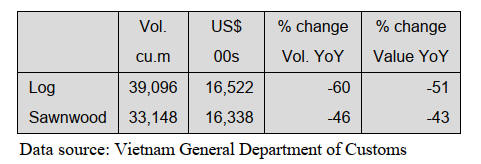
Vietnam’s forest cover in 2022
In 2022, Vietnam’s forested area was reported at
14,790,075 ha, including 10,134,082 ha of natural forests
and 4,655,933 ha of planted forest according to the
Ministry of Agriculture and Rural Development. The total
area of forests that meet the standards for calculating
forest cover was 13,926,043 ha. or 42.02%.
The Ministry assigned the Administration of Forestry to
establish a national forest resources database. Provincial-
level People's Committees nationwide were asked to
assign the People's Committees at lower levels to perform
the responsibilities of state management of forestry in
accordance with the provisions of the Forestry Law. The
Ministry required localities that recorded a reduction in
natural forest area in 2022 to investigate the causes of the
reduction and undertake measures to restore the forests as
well as identifying those responsible for the reduction in
forest area.
See:
https://vietnamnet.vn/en/vietnam-s-forest-coverage-remains-at-42-02-agriculture-ministry-2156777.html
Wood pellet production and trade highlights
In the first 6 months of 2023 Vietnam’s wood pellet
exports amounted to 2 million tonnes with the value of
nearly US$325 million being down year-on-year by 12%
in volume and 8% in value.
After several months of rising prices in the second half of
2022 in the first 6 months of 2023 the average price for
wood pellets exported from Vietnam dropped by 3% to
approximately US$157/tonne.
In June 2023 the export price of wood pellet had fallen
below US$136/tonne, down by nearly 30% compared to
the priced recorded over 6 previous months. South Korea
and Japan remain the two largest buyers of Vietnamese
wood pellets.
In the first 6 months of 2023 Japan imported over 1.16
million tonnes of pellets worth more than US$195 million,
up 6% in volume and 29% in value over the same period
in 2022. During the same period, South Korea imported
more than 840,000 tonnes worth nearly US$116 million,
down more than 33% in volume and nearly 43% in value
compared to the same period in 2022.
The price of exported wood pellets from January 2022 to
the end of June 2023 is shown below. After a year of price
soaring and peaking at US$189 per tonne in December
2022 wood pellet prices cooled and started falling from
March 2023.
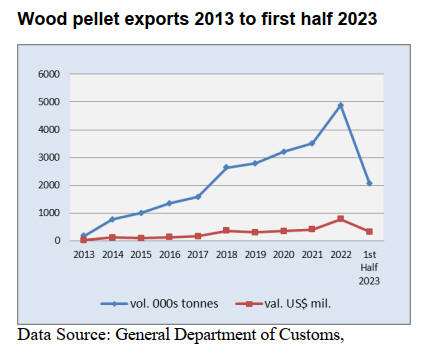
8. BRAZIL
IDB and BNDES to invest in
small businesses in the
Amazon
The Inter-American Development Bank (IDB) and the
National Bank for Economic and Social Development
(BNDES) signed a letter of intent to implement the PRO-
AMAZÔNIA Programme, which aims to finance Micro,
Small and Medium-sized Enterprises (MSMEs) in the
Brazilian Legal Amazon. MSMEs represent 99% of the
number of companies in Brazil and account for 27% of the
Gross Domestic Product (GDP) and 46% of jobs, mainly
in the service sector.
The programme will focus on modernisation, expansion,
procurement, innovation and sustainable practices to
create jobs and a balanced economy in the region.
The Amazon is crucial for biodiversity and the global
climate, making the programme an opportunity for
businesses that combine economic development with
sustainability.
Supporting MSMEs in the region will boost sustainable
technologies and economic drive. The total R$ 4.5 billion
loan will be implemented by accredited financial
institutions, respecting environmental and social policies.
The programme is scheduled to start in 2024 and aims to
foster sustainable development in the Amazon region and
reduce inequalities by supporting small businesses and
entrepreneurs.
See:
https://www.madeiratotal.com.br/bid-e-bndes-planejam-investir-r-45-bilhoes-em-pequenos-negocios-na-amazonia/
Bidding opens for forest concessions in Southern
Brazil
The Federal Official Gazette published a tender notice for
sustainable forest management and the utilisation
concessions in the Irati National Forest (Floresta Nacional
- FLONA) in the state of Paraná, Southern Brazil.
The Irati FLONA was created in 1986, covering 3,800
hectares in the Atlantic Forest biome. The Irati FLONA
was included in the Federal Government's Investment
Partnership Program (PPI) so can now be commercially
utilised with the possibility of replacing exotic species,
such as pines, with native species like araucaria.
The sale of pine, which is not native to the region will
benefit the region economically, deliver social gains and
improve sustainability. The forest concession aims to
revitalise the forest through the sale of wood not native to
the Atlantic Forest and to promote sustainable
management in the Irati National Forest.
See:
https://gmaisnoticias.com/governo-federal-abre-licitacao-para-manejo-florestal-sustentavel-na-flona-de-irati
Export update
In July 2023, Brazilian exports of wood-based products
(except pulp and paper) dropped 36% in value compared
to July 2022 from US$431.4 million to US$278.0 million.
Pine sawnwood exports decreased 56% in value between
July 2022 (US$90.5 million) and July 2023 (US$40.1
million). In volume, exports declined 43% over the same
period, from 305,800 cu.m to 173,500 cu.m.
Tropical sawnwood exports decreased 42% in volume,
from 45,500 cu.m in July 2022 to 26,400 cu.m in July
2023. In value, exports decreased 34% from US$20.3
million to US$13.4 million, over the same period.
Pine plywood exports witnessed a 21% decline in value in
July 2023 compared to July 2022, from US$65.3 million
to US$1.6 million.
However, exported volumes increased 2.4% over the
same
period, from 156,100 cu.m to 159,900 cu.m.
As for tropical plywood, exports decreased in volume by
51% and in value 54%, from 5,900 cu.m and US 3.7
million in July 2022 to 2,900 cu.m and US$1.7 million in
July 2023.
Wooden furniture export values decreased from US$58.1
million in July 2022 to US$47.5 million in July 2023, with
an 18% fall.
Strategies for environmental balance debated at
Amazon Summit
During the Amazon Summit countries of the Amazon
Cooperation Treaty Organization (ACTO) - Bolivia,
Brazil, Colombia, Ecuador, Guyana, Peru, Suriname and
Venezuela agreed to protect the largest rainforest that is
home to 10% of the world's biodiversity.
Combating deforestation, protecting biodiversity and
sustainable development in the forest were emphasised as
key strategies to reverse this situation. Sustainable Forest
Management (SFM) as advocated by institutions such as
AIMEX (Association of Timber Exporting Industries of
the State of Pará) is a solution allowing legal timber
extraction.
SFM in Federal Public Forests is authorised by Brazilian
Institute for Environment and Renewable Natural
Resources (IBAMA). Logging is only carried out in
authoriszed forest management units and it can be shown
it is possible to produce and preserve at the same time.
The entire timber production chain is traced/controlled
until products reach the consumer.
See:
http://www.remade.com.br/noticias/19367/cupula-da-amazonia---manejo-florestal-sustentavel-e-uma-das-principais-estrategias-para-o-equilibrio-ambiental-na-amazonia
Increase in production but exports revenues fell
in
Pará
According to the Ministry of Industry, Foreign Trade and
Services in the first half of 2023 in the State of Pará there
was a 40% decline in revenue from timber exports despite
an 8% increase in the volume of timber traded
internationally compared to the same period in 2022.
In the first six months of this year the State collected
US$133 million from exports compared to US$221.9
million in the first half of the previous year, exporting
about 150,000 tonnes with the US being the main
destination. The US and the EU accounted for more than
75% of the state's total export revenue in the period.
Pará remains Brazil's main exporter of timber from natural
forests. The fall in exports is attributed to the weakness in
the global economy which led to a decline in wood
consumption. The depreciation of the US dollar and the
excess stock of timber in the EU also affected prices.
The most exported product during this period was from
teak plantation logs in Pará, with 62,000 tonnes exported
to India according to AIMEX. In Pará, timber can only be
exported in its raw form if it comes from forest
plantations. Otherwise it must be processed in the state.
One of the main processed products is profiled timber,
including flooring, decking and friezes.
See:
https://g1.globo.com/pa/para/noticia/2023/07/28/para-teve-queda-no-faturamento-com-exportacao-de-madeira-mesmo-diante-de-aumento-na-producao.ghtml
Through the eyes of industry
The latest GTI report lists the challenges identified by the
private sector in Brazil.
See:
https://www.itto-ggsc.org/static/upload/file/20230816/1692147989860563.pdf
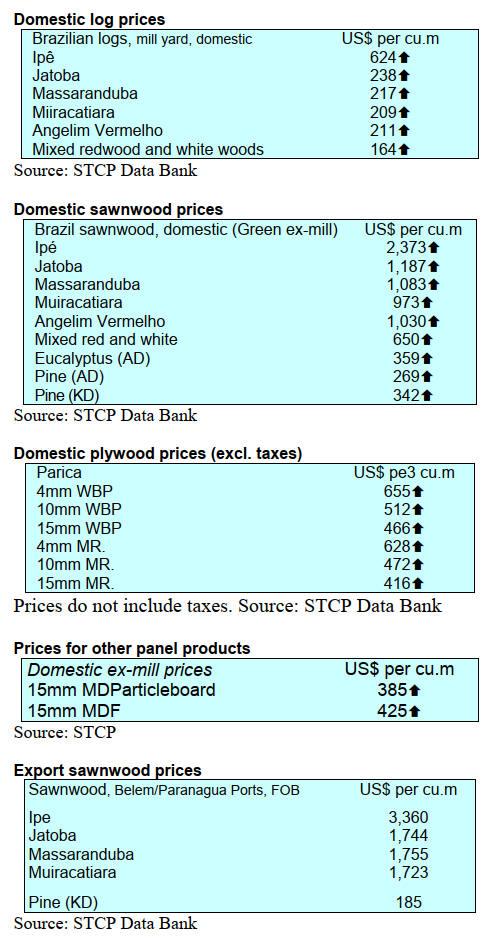
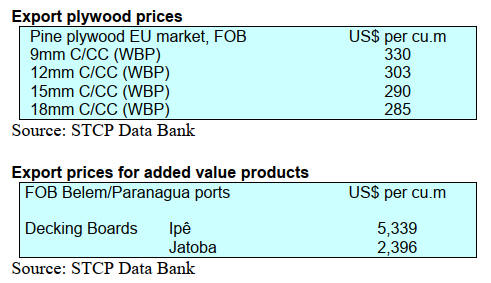
9. PERU
Shipments of sawnwood
declined
According to the Management of Services and Extractive
Industries Division of the Association of Exporters
(ADEX,) exports of sawnwood in the first five months of
the year earned US$18.1 million, representing a drop of
21% year on year. The main destination for exported
sawnwood was China which accounted for almost 30% of
all shipments.
Exports of sawnwood to China increased around 15%
compared to the same period of the previous year. The
second largest market was the Dominican Republic which
accounted for 26% of exports of sawnwood but here there
was a decline of around 45%.
Meanwhile, Mexico the third largest market, increased
sawnwood imports from Peru by over 65%. Likewise,
Ecuador doubled sawnwood imports from Peru.
Training to detect and control forest crimes
A total of 24 prosecutors and assistant prosecutors in the
Ucayali region successfully completed a course on
Sanctioning Administrative Procedure that will contribute
to the evaluation of environmental crimes.The Director of
OSINFOR's Forestry and Wildlife Sanctioning Procedures
said “we have seen a decrease in illegal activities in the
forestry sector but it is still not enough. That is why this
course was important for strengthening skills to detect
crimes and act in a timely manner”.
Inclusion of shihuahuaco and tahuari in CITES
The National Forest and Wildlife Service (SERFOR),
together with the National Amazon University of Madre
de Dios (UNAMAD), organised a course on species
identification focused on the genera Dipteryx and
Handroanthus .
The course, which is part of the actions of the "Action
Plan for the proper implementation of the inclusion of the
Shihuahuaco (Dipteryx genus) and Tahuarí (Handroanthus
genus) in Appendix II of CITES, had the objective of
strengthening the capacities of the technicians responsible
for carrying out forest censuses and/or population studies
in the Departments of Madre de Dios, Loreto, Ucayali and
Junín.
The Action Plan aims to provide the foundation for
technical and regulatory conditions so that from November
2024 the international trade in the products obtained from
these forest species is uninterrupted and the socio-
economic benefits of those in the supply chain are
maintained.
